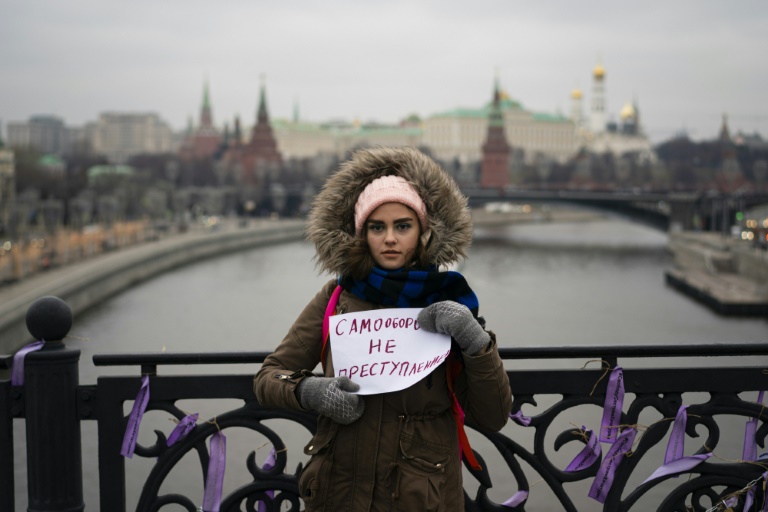Russia rejected calls to tighten domestic violence legislation Thursday, despite a European court ruling ordering Moscow to act on the “staggering scale” of abuse of women in the country.
According to activists, nearly 16.5 million women in Russia suffered domestic violence every year before the pandemic, with virus curbs only exacerbating the problem.
The European Court of Human Rights (ECHR) this week called out Russia’s “failure” to protect women against violence within the home, saying “women in Russia are in a situation of de-facto discrimination.”
It said Russia’s lack of legislation on domestic violence had created a “climate that was conducive” to abuse.
President Vladimir Putin’s government in 2017 decriminalised some forms of domestic violence, classifying them as an administrative offence and not a crime.
Campaigners — who for years lobbied for stricter laws — hailed the ECHR ruling as historic and said it should pave the way for new legislation.
But Kremlin spokesman Dmitry Peskov shot down those hopes Thursday, saying the present laws were sufficient.
“We believe current legislation provides all necessary tools to combat this evil and law enforcement agencies are making efforts,” Peskov told reporters.
“Of course, unfortunate and tragic incidents do occur,” he said, adding: “I don’t want to comment on the decision of the court.”
– Hands cut off by husband –
Leading womens’ rights activist Alena Popova said Peskov’s comments showed that the authorities had not taken any “final decision” on changes to the law and vowed to push for legislation she has co-authored.
Oksana Pushkina, a former lawmaker from Putin’s United Russsia party who campaigns for women’s rights, said Peskov’s comments were “very irresponsible.”
The ECHR ordered Russia to pay compensation Tuesday to four women who were battered or narrowly escaped being killed by their partners and who had had complaints to police ignored.
One of them, Margarita Gracheva, had her hands cut off by her husband in a case that shook Russia in 2017. The court ordered for her to be compensated with more than 370,000 euros ($419,000).
Gracheva said she was happy with the ruling and hoped Russia would listen.
“There are many of those who are already dead and can’t tell their stories anymore,” she said in a video on Instagram.
The court also ordered Russia to pay 25,000 euros ($28,200) to Natalia Tunikova, who reached for a kitchen knife and stabbed her partner as he pushed her towards an open balcony in their high-rise flat.
“She was prosecuted for causing bodily harm to her partner, but her own complaint against him failed,” the court said.
She told AFP it was impossible to prove in court that her act was in self-defence.
Lawyers said women who cause bodily harm while protecting themselves from violent partners — often in acts of desperation to save their lives — have slim chances of not ending up behind bars.
Activists say the vast majority of Russian women serving sentences for murder were defending themselves from abusive partners.
Two other women whose cases Russian police refused to investigate were also ordered to be compensated.
– Mixed messages –
The ruling in Strasbourg was a second hopeful moment for activists, after Russia’s constitutional court in April ordered stronger laws to punish repeat offenders.
But authorities have sent mixed messages on the prospect of new legislation even with two draft laws ready — one prepared by women’s rights campaigners, the other by the upper house of parliament.
Putin last week hinted his administration on the whole supports the latter, but said it should be “more balanced.”
“I myself promise, I will try to work on this topic, and talk with those who express these concerns,” Putin said in a meeting with his rights council.
In 2019, a bill that would have introduced harsher punishments for first-time offenders, including jail time, was shunned by Russia’s conservative groups, including the politically connected Orthodox Church.
The ECHR also urged Russia to provide access to restraining orders and train law enforcement officers on domestic violence.









